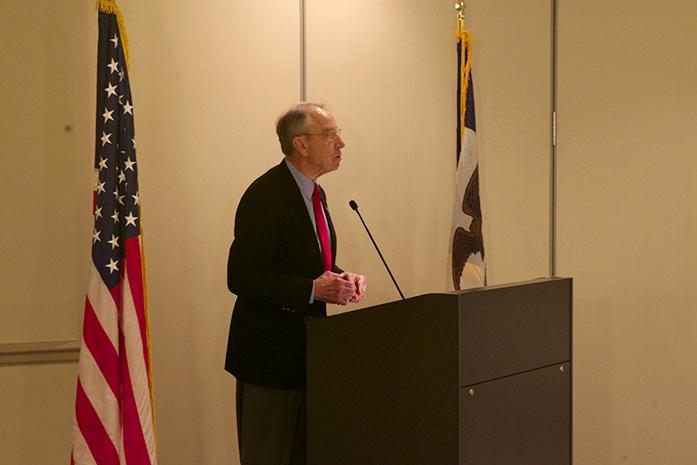Iowa Sen. Chuck Grassley and a handful of his Senate colleagues unveiled revamped criminal-justice legislation on Thursday that was once billed as the best bipartisan hope for this session of Congress.
More than 200 days ago, Grassley, the chairman of the influential Judiciary Committee, announced an agreement on reforms to mandatory minimum sentences for federal inmates along with provisions on prison reform.
“We now have 37 cosponsors; there are not many types of bills with these magnitudes that earn this type of support,” Grassley told reporters during a press conference. “Obviously, reaching a consensus has not been easy.”
Mandatory minimums have been around for decades, but they were enhanced during the late-1980s and early 1990s because of nationwide hysteria over drug use and crimes related to it.
Focus on the issue has sparked action on both sides of the aisle.
But the Senate hit an initial roadblock in Grassley, who publicly stated his strong opposition to an early version of the bill. Getting Iowa’s senator to acquiesce was something Sen. Mike Lee, R-Utah, and especially Sen. Dick Durbin, D-Ill., made sure to point out in October 2015 when the current bill was unveiled.
“We think this the most comprehensive, far-reaching criminal-justice reform which Congress has seen in decades,” Durbin said. “Mandatory minimum sentences were once seen as a strong deterrent, but we now know, sadly, that they have filled the prisons with many people who are not a real danger.”
President Obama also listed criminal-justice reform as one of the top areas he hoped to find agreement on with a Republican-controlled Congress.
Among those who joined the original sponsors on Thursday was Sen. Mark Kirk, R-Ill., who is facing a tough re-election campaign.
Despite all the celebration, the senators were noncommittal on when their bill would go to the Senate floor. Grassley said he not spoken to Majority Leader Mitch McConnell about the topic, but given the new support, he would do so soon.
But at least one top GOP leader, Sen. John Cornyn, R-Texas, said the legislation now has now the elements McConnell looks for when deciding if a bill deserves a vote.



